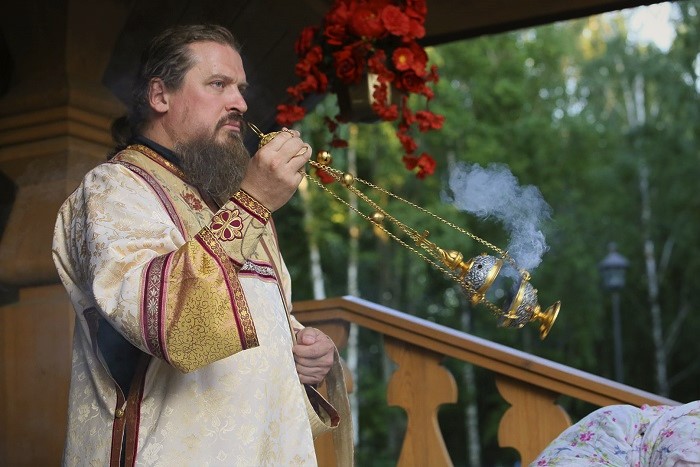
Dear Friend,
I would like to respond somewhat backwards to your questions about sex beginning with your questions, “Where are the healthy Orthodox Christian marriages in the hagiography? and Why does the Church seem so down on the pleasure of sex?” and then move to the matter of ontologically-based sexual morality, and finally offer some suggestions and some advice about how to think about this matter. I will speak directly and not pull any punches. May God help us both!
That you only mention pleasure in reference to Orthodox Christian teaching about sexuality and the saints in your letter identifies you and I both as products of a post birth control, post antibiotic generation, a very, very new phenomenon in history. The Fathers always connect the pleasure of sex with the pain of childbearing (which includes not only the birth itself, but also the care for and raising of children) along with other relational burdens
(such as your body no longer belonging to yourself but to your partner – cf 1 Corinthians 7) and the myriad of diseases that are the fruit of unrestrained sexual practice. All of these are or can be part of the “pain” that accompanies the pleasure of a relationship that is sexually intimate. That you and I so easily separate the two perhaps shows how out of step with the Church we are as products of this culture.
Children and the burden of caring for them and raising them into healthy human beings is and always has been the principle (but not exclusive) purpose of sexual intercourse – this is a fact of biology first of all, and only secondarily a matter theology. So, not too long ago historically speaking, the only way to avoid the responsibility of children was to avoid sexual intercourse. If you wanted the leisure to learn to read and to pray with any regularity and discipline, the only two practical options were monasticism or great wealth. Anyone who was not very wealthy and yet wanted to develop a prayer life or an intellectual life had only one option: celibacy. If you had sex, you had kids that you had to feed, protect and shelter. If you were celibate, you only had to care for yourself, and in an intentional community that ate very little and worked very hard (a monastery), it was possible to devote lots of time to prayer and study. Since the only people for most of history who could read and write anyway were monks, it makes sense that most of what is written about saints in the past is about celibate men and women – or married men and women who became celibate. However, you don’t have to read too deeply to figure out that many of the saints had robust sex lives – even though (for obvious reasons) it is not mentioned explicitly.

The parents (or one of the parents) of many of the saints are also saints. And these saints came from large families. Something must have been going on. Or take our Holy Foreparents Abraham and Sarah (and Sts. Joachim and Anna, and Zachariah and Elizabeth) for example. They must have still been sexually active in old age if they were still earnestly praying for children in their eighties and nineties – and when they finally do have a child, it is through God-aided regular biology, not immaculate conception. However, the Orthodox Church very seldom addresses sex directly, except where it goes wrong – which is how the Orthodox Church deals with just about everything: The Church does not multiply dogma unless there is a need. Saints with children are Saints who are having sex, and if they have a lot of children into their old age, then they are probably enjoying lots of sex for a long time, but obviously that is not what you want to focus on if you are a monk writing for other monks.
If a married man and woman wanted to devote their life to prayer and study, however, then for most of history they had to live together as brother and sister. In such cases dealing with desire is a huge issue. And that is why a lot of the Church’s writing about sex focuses on controlling desire. Even St. Paul talks about this in the New Testament. It has not been at all uncommon in the Church that married people have stopped having sex – not because the pleasure is bad, but because the freedom from responsibility for children is more desirable than the desire for sexual pleasure. However, that does not make the desire for pleasure go away. And that is why a lot of the Church’s writing about sex focuses on controlling desire. It is not unlike the problem with diet. The desire to be healthy and be of a reasonable weight does not make the desire for the pleasure of eating fattening and unhealthy foods go away. The Fathers are quick to point out that because of the nature of the world after the fall, pleasure is always coupled with pain, the roses always have thorns. We have to pick our pleasures. Who do we want to be?
Which brings me to the matter of ontology – how sex relates to what we are, to our being as creatures of God. Before the fall, we were certainly sexual creatures, Genesis makes that pretty clear; but we were not driven by sexual passions. So if we want to talk about sexuality rooted in ontology, then we have to deal with the problem of passion. Ah, there’s the rub. Human beings, male and female (together) are created in God’s image. So to understand how sex relates to our being as creatures of God, we have to look at what God says about sex relating to Himself – and in the Bible and the liturgies of the Church, God says a lot about Himself using sexual language. God is the Bridegroom who betroths humanity to himself as a virgin bride. God has no other lovers. God does not “consummate” the marriage until the “Wedding Supper of the Lamb.” God suffers everything to present to himself a virgin bride. The sexuality of man and woman created in God’s image reflects this; or rather, the way the Church talks about God using sexual metaphor reflects God’s relationship with human kind seen most clearly in how human beings were created to relate to one another sexually.
Ontologically speaking, we are virgins who offer our virginity to God our Groom who has purchased us with His Life and cares for us forever. Biological virginity is the manifestation in time and space of this ontological reality. Thus, there are two states in Christian anthropology: the virgin bride of God expressed in either the monastic state that iconically manifests the virginal longing of the espoused bride for the Bridegroom, or the married state that iconically manifest the longing fulfilled in the fruitfulness (and faithfulness!) of God’s ultimate consummated relationship with mankind. Anything else is an aberration. Aberrations, though, are not the end of the story. God continually calls his unfaithful spouse back to Himself. Biological virginity is meant to be a manifestation of a deeper, inner virginity – an inner virginity that can be restored through repentance even if the outer virginity has been lost (i.e. St. Mary of Egypt is listed among the Holy Virgin Women).

Stepping down from ontology to morality, we have to admit that morality is often influenced by culture. Yes, King David had many wives and concubines (although he did take responsibility for them and their children for the rest of their lives). We can also point out that many christians (Orthodox or otherwise) completely ignore certain Biblical and canonical prohibitions against, for example, lending money at interest and other moral teachings of the Bible or the Church Fathers (e.g. the prohibition against selling church properties, the commandment to tithe, the prohibition against work on the Sabbath/Sunday or against taking a fellow Christian to secular court). However, in spite of some pockets of cultural waffling or slippage in some areas of the Church’s moral teaching, the moral teaching regarding sexual behaviour has been amazingly consistent throughout both Jewish and Christian history and in multiple different cultural settings. Even in the midst of secular cultures that were very sexually loose, Christians have never allowed polygamy (or polyandry for that matter) and have only reluctantly allowed divorce (or annulment, which has become a longer and more expensive route to the same end). Even in ancient Jewish contexts that allowed polygamy, it was expected that the husband was to care for all wives and concubines and their children for life. And certainly in all Jewish and Christian contexts – I really cannot think of one exception – any sexual intercourse outside of marriage was considered a moral failure, a failure that at least for Christians can be forgiven and healed, but a sin nonetheless, a missing of the mark. This universality of understanding about sexual morality is, it seems to me, quite significant.
But what do we do now? What do we do in an age of birth control and penicillin? And what do we do in a culture of sexual license? Well first regarding modern medical technology, I must point out that I do know people who are suffering terribly from physical conditions – not to mention psychological conditions – acquired through sexual licentiousness and despite modern medicine; and despite modern birth control, unintended pregnancy is common and often tragically ends in the death of the child and the serious maiming (if not physically, certainly psychologically and spiritually) of especially the mother and also the father. Also, regarding Christian morality in a sexually free culture, we must acknowledge that the Church has been here before, often. It might help us to look at what the Church has actually said in these sexually licentious cultures – but let’s save that for another time (take my word for it, the Church teaching has historically become more explicitly strict, not less, in sexually licentious cultures).
But to be practical, let’s look at dating. For a Christian, dating is not a good idea. However, many Christians find themselves single and living on their own. They do not know how to get to know someone whom they might want to marry except through dating. Yet even in a dating model, it is not that difficult to avoid physical sexual intimacy if you really want to avoid it (which is really the issue). Physical sexual intimacy requires privacy. If you don’t want to have sex, don’t go somewhere with your date where you could have sex. In other words, only be alone with your girl/boy friend in public settings: parks, restaurants, malls, bowling alleys, etc. Don’t park your car in a lonely spot “to talk.” Talk in a corner in the library, talk walking in a park, talk at church, talk on the bus. Don’t, for God’s sake, go to each other’s homes. No news here. The problem isn’t avoiding physical sexual intimacy, the problem is wanting to avoid it, which of course we don’t – u0nless we very much want to live as the Church has taught us to live. And even then, desire does not go away; so we must, as St. Paul says, “walk circumspectly.” We have to be careful not to let ourselves get into situations in which we could possibly do what our passions are screaming at us to do but that we really don’t want to do.
Now regarding compromise. Many have said, and indeed this is what the general culture says, if it is “really” loving, it is okay. But what does that mean? Legion are the people who have given in to this line of reason only to find out a few weeks or months later that “real” love is not really as real as they had thought. If you really love someone (in that way) and really want to spend your life together, then really get married. Commit. For life. That’s real love. At least that is real love as it has been revealed to us by God. It is how God loves. It is how God has called us to love.
But, you might say, a wedding is only a ceremony, a piece of paper. The real marriage is in our hearts – and in a technical, theological sense, the real marriage may even be understood to be the actual act of sexual intercourse itself with the blood of the first virginal intercourse being the seal of the covenant. However, the fact is that we don’t really want to be married (at least not yet), and we may not even be sure, for sure, for sure, that we want to be married to this person. We merely want to dance but we don’t want to pay the fiddler (as my foster mother used to say) – or we don’t want to pay the fiddler yet, we’ll pay sometime later if it works out. That is, we may devote our lives to each other as a holy icon of Christ and the Church later, if it works out. Honestly, this argument that the ceremony doesn’t really mean much is actually an argument to wait for sex. If the sexual act itself is indeed the symbol of the commitment (rather than the ceremony being the symbol), then definitely the sex should wait until the commitment is certain. That is, if sex is not really merely about mutual affection.
I’m all for mutual affection, but is that what Christ and the Church has taught us that sex is for? Typologically, it is kind of like treating the Holy Eucharist as a common thing (c.f. Hebrews 10:29 and 1 Corinthians 11: 17ff). Holy Communion is our participation in the very Body and Blood of Christ. It is for the forgiveness of our sins. It is for our sanctification. It is our uniting with Christ and His Body. But if we treat the Holy Eucharist as a mere snack, as something we eat because we have the munchies, then like the Corinthians to whom St. Paul was writing, we are eating and drinking condemnation to ourselves. Why? Because the very means of our salvation we are no longer treating as the very means of our salvation. If we despise what God has given us for our salvation, then there is no other salvation. It is not as though God has plan B. Sex functions similarly.

Sexual intercourse in life-long marriage is an icon in the flesh of God’s love for mankind. Sexual intercourse is how we participate with God in the creation of new human life. Sexual intercourse is part of the glue that keeps a man and women united for life – the secret garden, the spring that does not run into the streets, the hiding place of love. But can sexual intercourse be all this to us if we treat it as a common thing, as an mere expression of mutual affection – or worse yet, as a mere means of giving mutual pleasure? Not that sex is not or should not be pleasurable. It should be pleasurable, just as the Holy Eucharist should taste sweet, but mere pleasure is not the purpose. As far as the Church is concerned, physical pleasure is just the tip of the tip of the iceberg of what sexual intercourse is about.
And regarding this matter of compromise, I must also point out that if someone and his/her girl/boy friend have significantly different views on sexual morality at the beginning of the relationship, then most likely it indicates that the foundation for a life-long monogamous relationship does not exist. I am not saying that a relationship is impossible. But I am saying that how you treat sex before you are married will certainly influence how you experience and think about sex after you are married. You are setting a pattern, a precedent for life.
Nevertheless, everything can be healed in the Church. Nothing is impossible. But there is the easier way and the hard way and the very hard way. What do you want sex to mean to you and your possible future spouse for the rest of your life? Is it merely an expression of affection and mutual pleasure or is it an icon of Christ and the Church, a commitment to be with and for each other forever, a devotion to cling to one another throughout
your entire life no matter what? You have to decide.
My friend, I know this sounds harsh. But honestly I would speak just as directly to a parishioner who told me that they wanted to join the army so that they could go fight in Afghanistan. It is a serious matter. Just like joining the army, sex eventually becomes a matter of life and death, even if it doesn’t seem that way at first.




